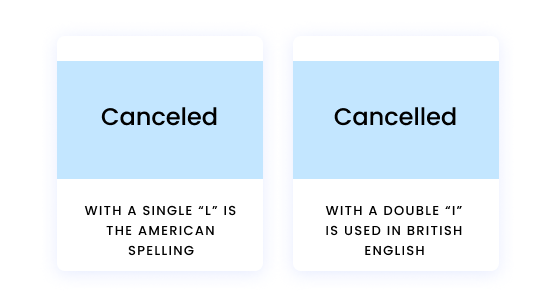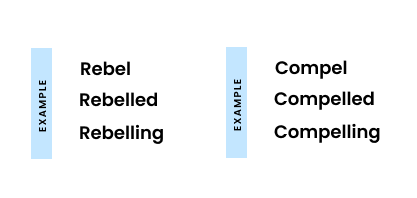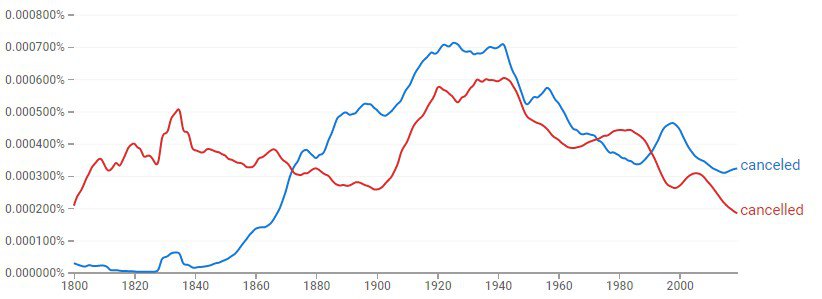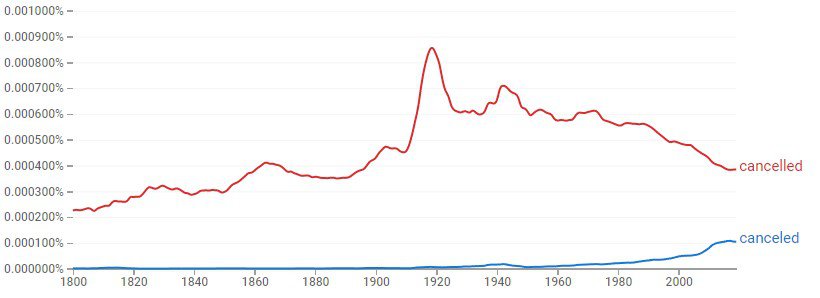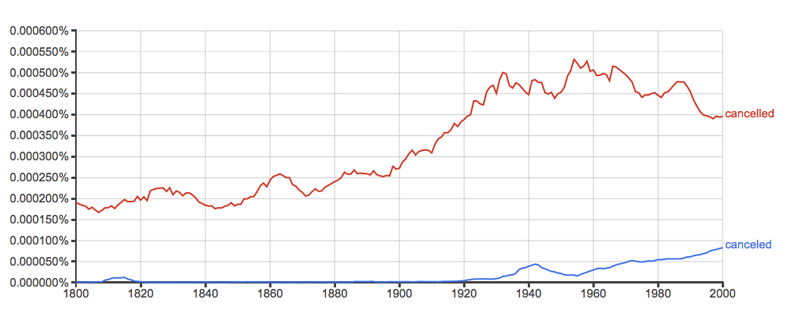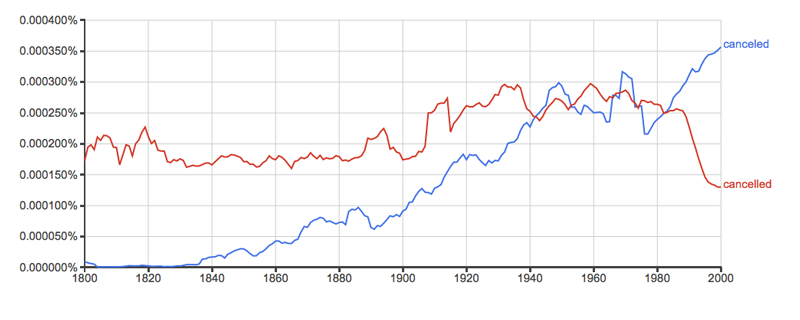Remember when you were a kid and the confusion between canceled vs. cancelled got you into an argument with your classmate?
Now that you’ve grown up, you’re likely looking to get over this confusion between the two English spellings so you don’t use it incorrectly on social media or in your professional communication.
So what’s the correct spelling — canceled with one “l” or cancelled with two “l”s? The short answer is: both are correct. The long answer: the preferred spelling depends on where you live and who you’re writing for.
Let’s clear up this confusion by diving deep into the story behind canceled vs. cancelled, so you can know how to use the correct spelling.
Canceled vs. cancelled: which is the correct spelling?
While they use different spellings, they mean the same thing: the past tense of the verb cancel. The difference lies in whether you’re writing for an American audience or a UK audience.
For beginners, here’s the difference between canceled vs. cancelled:
The double “l” or (“LL”) version is also the one that’s used in other countries outside the US, including Canada and Australia.
This holds true for most versions of the past tense of cancel such as cancelled and cancelling, and even the word canceller.
However, with the word cancellation, you’ll always use double “l” irrespective of where you live or who you write for. So, in a sense, cancelation is incorrect. Why? Because the generally accepted spelling for cancellation has double “ll” — there’s no American or British English in this case. Strange, right?
Let’s look at examples now:
The universal cancellation: You may also receive an email, SMS, and/or a phone call from us informing you about your flight cancellation. (FlyDubai)
Is it cancelled or canceled in Canada?
Canadian English uses cancelled, the same as British English. In fact, double “ll” is used in most countries other than the US that uses single “l”.
When is it okay to use double “ll” in the American spelling of canceled?
Now, here’s where things get complicated (feel free to lean into your screen right about now): in some instances, the American spelling uses double “ll” in variations of cancel.
But before you go all ninja on me, let me explain. When Americans like to stress the final syllable of a word, they add to the effects by using double “ll”.
For example:
Similarly, cancel becomes cancelled and cancelling in American English. This is why you sometimes see cancelled with a double “ll” in American books, captions in your favorite TV show, and publications such as the New York Times.
The root of the different spellings
The difference between canceled vs. cancelled is the same that you’ll find in other American and British spellings. For instance, color and colour, honor and honour, and favorite and favourite are all different.
The canceled vs. cancelled difference, in particular, arose when leading dictionaries started using the different spellings. Brits chiefly use spellings outlined in Samuel Johnson’s A Dictionary of the English Language.
On the other hand, American publications follow spellings given in Noah Webster’s An American Dictionary of the English Language.
In the 1806 version of Webster’s dictionary, cancelled (double “ll” like in British English) was used. However, Webster — the spelling simplicity proponent that he was — used canceled with a single “l” in the 1828 dictionary version. Following Webster’s dictionary, using canceled became common in American English.
American English: examples of canceled
• For the second year, Boston Calling has been canceled due to the coronavirus pandemic, organizers announced Monday. (Boston Globe)
• Canceling the contract would be cheaper but not cheap. (Chicago Tribune)
• The entertainment news show, launched in 1991, was canceled in response to the economic fallout from the coronavirus pandemic, a representative for NBC Universal confirmed with CNN Business in an email. (CNN)
British English: examples of cancelled
• Unsurprisingly, the last one caused the biggest backlash, with right-wing pundits claiming that “childhood is cancelled” after the estate of Dr. Seuss quietly removed six lesser-read books which they said featured “hurtful and wrong” racial stereotypes, first published in 1937. (The Independent)
• Then, without any warning whatsoever, your new favourite TV series, is cancelled. (Stylist)
• YouTuber and makeup artist Manny Gutierrez found himself “cancelled” following an online feud with fellow vloggers. (BBC)
When to use canceled vs. cancelled (and how to remember it)
The preferred spelling depends on a couple of factors:
Understand who your reader is.
If you’re writing to apply for a university in the UK, you’re likely going to impress the recipient by using cancelled, the British English version.
Understand which spelling your company uses.
If you’re well into your career already or are starting one as a writer or journalist, understand which spelling the publication or brand you work with uses. Chances are they’ll give you a stylebook that’ll answer this question for you. If not, read internal content and see which spelling is used.
When in Rome, do as the Romans do.
If you’re not professionally writing or communicating, you’ll want to use the spelling that others who live in your state/region use. For instance, if you’re currently in New Zealand, use cancelled.
The question now is: how do you remember to use the correct version based on your location, target readers, and publication preferences?
Use Writer to automatically help you correct the version. All you need to do is set up the default setting to US or UK English or make a style guide for your brand and go on to use the right spelling. Kudos! It’s that simple. Start a free trial today.
More resources
While both canceled and cancelled are acceptable for the past tense of cancel, the version with one L is more common in American English, while the version with two L’s is more common in British English. American English typically only doubles the consonant when the stress is on the syllable attached to the suffix, as in remit and remitting.
Some blame and some credit go to Noah Webster.
Many questions about grammar and usage have two answers, a simple one and one that is not so simple. For instance, the question of whether funner is a word may be answered in the following ways: ‘of course it’s a word, and don’t you have better things to worry about?’ and ‘while most dictionaries consider this a word, your own feelings on the matter are likely dictated by whether or not you feel that the word fun has assumed enough of an adjectival state to merit its comparative and superlative forms.’ It can be useful to have two types of answers like this, as it makes it far more likely that we can provide an answer that will annoy everyone.
British vs. American English
Another fine example that has answers of varying degrees of complexity is the question of how many Ls one should use in the past or present participle form of the verb cancel. The simple answer to the question of ‘is it canceled or cancelled’ is “either one is fine.”
Now for the less simple answer. Canceled and canceling are more common in the US, while cancelled and cancelling are more common in British English. As explained by Lynne Murphy, American and British English have many similar habits when it comes to past and present participles: both double the final consonant of a word when it follows a short vowel and has the stress on the syllable attached to the suffix (such as remit/remitted/remitting). However, if the stress does not come on the syllable that attaches to the suffix then the final consonant is not doubled (as is the case with edit/edited/editing).
Origin of Single-L ‘Canceled’
It is easy, as with the case of many of the words which are spelled differently in the US, to place the blame/credit with Noah Webster. However, while Webster’s early 19th century dictionaries helped solidify many of the spelling differences between these forms of English, in most cases he was simply making note of an orthographic variation that already existed. Webster’s 1806 dictionary has cancelled, but in his 1828 the word is spelled as canceled.
There are examples of cancelled in American use, and of canceled in British, so you needn’t feel bad about yourself if you mistakenly use the variant that is less common where you live. And if you still feel bad about your spelling allow us to give you some comforting words on the subject, taken from the Merriam-Webster Dictionary of English Usage: “Our present-day spelling, then, is a mishmash of archaism, reform, error, and accident, and it is unsurprising that not everyone who is heir to the tradition can handle it perfectly.”
MORE TO EXPLORE: What It Means to Get ‘Canceled’
From cancel culture to cancelled flights, the word ‘cancel’ can present itself in different ways, depending on the context. Writers of all levels have struggled with words like this. Let’s get into the details on the difference between cancelled and canceled and when to use them.
Canceled or Cancelled?
Canceled, with one L, is used in American English, and cancelled, with two L’s, is preferred in British English and outside of the U.S.
Why Cancelled and Canceled are Different
Cancelled and canceled are only different in spelling and origin. Obviously, one word has a double L, while the other only has one. But the most significant difference between them is that cancelled is British English, while canceled is American English.
So, what’s the logic behind American English’s use of a single L? In the 19th century, Noah Webster of the Webster’s Dictionary thought some words kept their value with a letter removed.
Even with a simplified spelling, canceled still sounds and means the same as cancelled. The same is accurate with other American spellings, like honor/honour and color/colour.
Thanks to Noah Webster’s dictionaries, these American spellings became official. However, these orthographic variations were already present before.
The present progressive form of the verb may also use single or double L. This means canceling and cancelling are also acceptable.
When to Use Canceled vs. Cancelled
Spelling variations of the same word can be confusing. Like, authorise vs authorize, or apologise vs apologize.
Use canceled when writing in American English, and use cancelled for British English. Don’t get confused about their definitions because they are the same. Cancelled and canceled come from the simple verb form, cancel, which means:
- To annul, make void, or revoke. E.g., She canceled/cancelled her transaction.
- To call off an event or occurrence. E.g., My sister’s flight was canceled/cancelled.
- To compensate for one another. E.g., Our opposing votes always cancel each other.
Here are other examples that use American English and British English in a sentence:
- Allan canceled our reservation because I already had dinner.
- Allan cancelled our reservation because I have already had dinner.
Here’s a bonus lesson, which you’ll find helpful later on: American English usually uses simple past tense. And British English uses present perfect tense.
Other words with spelling differences that follow the same guideline include modeled and modelled and bejeweled and bejewelled.
More American Examples
Take a look at these other American examples of canceled and canceling in a sentence:
Many flights have been canceled, forcing more passengers to connect at big and increasingly crowded hubs. [New York Times]
Under current law, it is scheduled to rise to 6.8% on July 1, an increase that Obama has called for canceling. [Los Angeles Times]
Moriarty added that an earlier cancellation could have allowed the slot to be resold, which would have resulted in a credit being issued. [Boston Globe]
But there’s a catch. Some verbs that end in L use a double L for their American past tense. Here are some examples:
- Rebel, rebelled, and rebelling.
- Compel, compelled, and compelling.
- Enrol/Enroll, enrolled, and enrolling.
- Dispel, dispelled, and dispelling.
If you want to know whether you should double the L or not, try to pronounce the word. If the final syllable is heavy, a double L is the preferred spelling. If not, use single L. Some American publications also use cancelled to emphasize the last syllable.
More British Examples
Check out these British differences in spelling for cancelled and cancelling in a sentence. Note the double-L spelling:
It emerged yesterday that the girl, named only as Merthe, had gone into hiding with her family after cancelling the party. [Irish Times]
Allegations of black market touting by foreign Olympic committees could see thousands of tickets cancelled. [Independent]
British English vs. American English
British English and American English differ in sentence structure and spelling. One instance is when you maintain or double the last letter when adding inflections like -ed, -ing, -er, and -or.
You already know that British English always doubles the L. Hence the word cancelled. And American English uses a single L, except when you stress the last syllable.
To tell the difference between the two, just remember that American books and publications use words that are shorter most of the time for an American audience. The terms have “reformed” spellings which many Americans advocated for in the past. Some pushed the change as a form of protest, while others aimed to simplify the language.
Even American sentences are shorter. Remember our previous example on using simple past and present perfect tenses? Americans would say, “I already had dinner,” while British people would say, “I have already had dinner”.
British and American Usage Trends
As the Ngram below shows, American English has only recently adopted the one-l spellings of canceled, canceling, etc., and the change is not fully engrained in the American language. In web searches of American publications covering the last couple of years, cancelled and cancelling still appear about once for every five instances of canceled and canceling. Outside the U.S., meanwhile, the one-l spellings appear only very rarely. This is true even in Canada, which is usually friendlier to American spelling idiosyncrasies than is the rest of the English-speaking world.
Similar Ngrams for British books (shown below)show the one-l forms beginning to gain ground in British English—likely due to the strong American influence on web-only publications from around the world—but the two-l forms still prevail by a large margin.
Spelling Exception: Cancellation
Now that you know the difference between canceled and cancelled, let’s talk about cancellation. This word is a spelling exception because it’s the standard term in American and British English.
No matter who your audience is, use cancellation instead of cancelation. Take a look at these examples:
- British Airways suggested rescheduling instead of a flight cancellation.
- I’m disappointed about the cancellation of Beyonce’s concert.
- You better go if you don’t want to pay a cancellation fee of £80.
- An annulment is a proper term for the cancellation of a marriage.
- She requested a cancellation of the event because she was afraid of being cancelled.
Cancelable or Cancellable
Cancelable, with one L, is the adjectival form of cancel and is the preferred spelling in American English. Cancellable with two L’s, is the preferred spelling outside of the U.S.
Does Canadian English Use Canceled or Cancelled?
Canadian English uses two L’s when spelling cancelled, cancelling etc. American and Canadian accents might sound the same, but their writing styles in English are very distinct.
Canadian English also uses other longer words as a spelling rule. It adopts “ou” in words like humour, behaviour, and romour. And they prefer “er” instead of “re,” as in centre and theatre.
Canadian Example
Student groups say organizers of the Canadian Grand Prix overreacted in cancelling the free opening day of the event. [CBC]
Does Australian English Use Canceled or Cancelled?
Australians also spells the word with a double L like Canadian and British spellings. Australian English uses cancel, cancelled, cancelling, and cancellation. Australians also spell humour instead of humor and favourite instead of favorite.
In Conclusion
Both canceled and cancelled are acceptable varieties of English, correct spellings, and have the same definitions. However, American English employs the version with a single L, while British English prefers double L. The key to avoiding any confusion is remembering that Americans use simpler spelling.
Remember to consider who your target audience is before using canceled or cancelled. Otherwise, people might cancel you!
February 25, 2023
Frustrated over a cancelled television series? Need to cancel your upcoming doctor’s appointment? Knowing when to use the word “canceled” vs. “cancelled” comes in handy no matter the situation. Learn the difference between these two words and find out how to use them correctly in your writing.

The difference between “canceled” and “cancelled”
Although spelled differently, the words “canceled” and “cancelled” have the exact same meaning. Both versions mean the past tense of the verb “cancel,” to decide that something will no longer take place. However, you’re not likely to see the spelling “canceled” outside of the U.S. The double “l” version of the word is British English and is often used in the UK and Canada, while American English uses the single “l.” The rule remains for most other versions of the word “cancel,” such as “canceling.”
British vs. American English
The difference in spelling doesn’t affect the meaning or usage of the word. Like many other words, cancel is a good example of how American English simplifies British English, typically by removing letters that won’t affect the sound of the word. Words like “behavior” or “color” are spelled with an additional letter in British English as “behaviour” and “colour.” If you have trouble remembering which version of a word is correct in American English, opt for the simplest or shortest form.
Polish your grammar with Microsoft Editor
Test your writing with Editor’s free grammar checker.
Learn More
Sometimes, the difference between British and American English goes beyond a simple letter or two. Words like recognize or apologize should always be written with a “z” in American English, but people in the UK are more likely to use an “s” instead.
“The double “l” version of the word is British English and is often used in the UK and Canada, while American English uses the single “l.” ”
What about “cancellation?”
The one exception to the rule is the word “cancellation,” which should be spelled with a double “l” no matter what audience you’re writing for. While the other forms of the word remain verbs, “cancellation” is a noun that includes additional syllables. By including two l’s in this form of the word, there’s a bridge between the original word and the new syllables.
How to use “canceled” in a sentence
“Canceled” should always be used as the past tense of the verb “cancel,” but you don’t need to remember any other specific rules when using the word. These sentences show how to use the word correctly in American English.
- “Amelia’s favorite television show was canceled after the first season.”
- “The teacher canceled the field trip because of the weather forecast.”
- “After his flight home was canceled, he decided to rent a car instead.”
After reading this guide on a commonly confused word, you’ll be able to avoid getting “canceled” for poor spelling or grammar. But if you’re still unsure about what words to use in your writing, double-check your sentences with easy-to-use grammar tools.
Get started with Microsoft 365
It’s the Office you know, plus the tools to help you work better together, so you can get more done—anytime, anywhere.
Buy Now
Topics in this article
Tags
More articles like this one
When to use ‘choose’ vs ‘chose’
The verb “choose” means to pick out or select something from multiple options. The key to knowing when to write the word “choose” vs. “chose” is understanding the tense in which you’re writing.
Learn more
What is a prepositional phrase?
Prepositional phrases are a key part of the English language. Find out how to improve your grammar by understanding how a prepositional phrase fits into your writing projects.
Learn more
What does “rhetorical” mean?
Rhetoric is language used to persuade others. Explore exactly what “rhetorical” means and how to use rhetorical questions.
Learn more
What are collective nouns?
Collective nouns are used to refer to a group of people, animals, or things. Improve your grammar and writing by learning more about collective nouns.
Learn more

Everything you need to achieve more in less time
Get powerful productivity and security apps with Microsoft 365
Buy Now
There’s no doubt that those of us who live in a snowy area are familiar with these two words. Each and every year, winter snowstorms across the country disrupt travelers’ schedules and school operations by canceling flights and classes—or is it cancelling?
The two words canceled and cancelled can cause some confusion for those writers not exactly sure when to use which one. Are they just variations of the same word? Do they have different meanings? Do they have different functions in a sentence?
In today’s post I will address all of these questions so that you will never second-guess yourself when writing these words again. So what is the difference between canceled and cancelled?
What is the Difference Between Canceled and Cancelled?

- Due to the couple’s breakup, the wedding was canceled.
- Are you cancelling our dinner plans?
- My credit card was canceled from lack of payment.
You’re probably still asking yourself, “Okay, when do I decide which one to use?”
The answer to that question is that the difference between them is entirely dialectal. There is no demonstrable difference of sense or function between them, meaning both words can be used interchangeably.
When to Use Canceled
Does canceled have one l? Even though the only thing separating these two words is a dialectical difference, it is still important to keep your audience in mind when picking which word to use and when.
Canceled (with one “L”) is the preferred choice in American English. We can thank Noah Webster for this. He is usually credited with the creation of American spellings that have fewer letters than the British counterparts. Color (colour), flavor (flavour), and labor (labour) are a few examples of this. Canceled is the recommended spelling in Webster’s 1898 dictionary. Likewise, The AP Stylebook prefers the use of cancel, canceled, and canceling, but it favors cancellation over cancelation.

When to Use Cancelled
Does cancelled have two ll’s? Cancelled (with two “L’s”) is the preferred choice in British English and is used much more frequently than canceled. The below chart shows the use of canceled and cancelled (as a percentage of all words used) in British English books, journals, and magazines from 1800 to 2000.
Similarly, the below chart shows the frequency of the two words in American English, with canceled being the preferred option, but, interestingly enough, it only became the dominate word within the last 30-40 years, as the two began to diverge around 1980.
Trick to Remember the Difference
One simple way to keep track of these two words is that the shorter spelling is American. If you can keep in mind that, generally speaking, British English favors (favours) the longer spelling of certain words, you will be able to remember the difference between these words.
Summary
Is it cancelled or cancelled? So, which word is which? Here’s what you need to know.
Although either cancelled or canceled can be used correctly in the same sentence, it’s important to keep your audience in mind when using these words.
- Canceled is the preferred American word choice.
- Cancelled is the preferred British word choice.
Contents
- 1 What is the Difference Between Canceled and Cancelled?
- 2 When to Use Canceled
- 3 When to Use Cancelled
- 4 Trick to Remember the Difference
- 5 Summary

